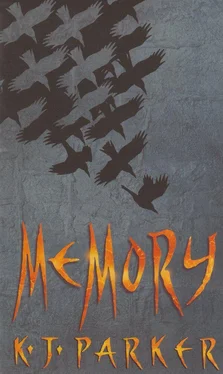K Parker - Memory
Здесь есть возможность читать онлайн «K Parker - Memory» весь текст электронной книги совершенно бесплатно (целиком полную версию без сокращений). В некоторых случаях можно слушать аудио, скачать через торрент в формате fb2 и присутствует краткое содержание. Жанр: Фэнтези, на английском языке. Описание произведения, (предисловие) а так же отзывы посетителей доступны на портале библиотеки ЛибКат.
- Название:Memory
- Автор:
- Жанр:
- Год:неизвестен
- ISBN:нет данных
- Рейтинг книги:5 / 5. Голосов: 1
-
Избранное:Добавить в избранное
- Отзывы:
-
Ваша оценка:
- 100
- 1
- 2
- 3
- 4
- 5
Memory: краткое содержание, описание и аннотация
Предлагаем к чтению аннотацию, описание, краткое содержание или предисловие (зависит от того, что написал сам автор книги «Memory»). Если вы не нашли необходимую информацию о книге — напишите в комментариях, мы постараемся отыскать её.
Memory — читать онлайн бесплатно полную книгу (весь текст) целиком
Ниже представлен текст книги, разбитый по страницам. Система сохранения места последней прочитанной страницы, позволяет с удобством читать онлайн бесплатно книгу «Memory», без необходимости каждый раз заново искать на чём Вы остановились. Поставьте закладку, и сможете в любой момент перейти на страницу, на которой закончили чтение.
Интервал:
Закладка:
He was right, of course, though it was a closer thing than he'd assumed it would be. But they were cheating, using the battering rams (mechanical advantage), which not only increased the force they were able to apply, but also smashed the woodwork up still further, making it harder to push against. As he shoved, his mind elsewhere (clearly they hadn't got archers with them, which was a blessing, but why? Because, stupid, they were expecting to fight light infantry in a forest with visibility restricted to thirty yards, terrain that would turn archers into casualties-in-waiting) Monach felt a slight twinge in his shoulder, which he recognised as minor damage to a tendon. Big deal, except…
Cutting it too fine. It was only a minute or so before the battering-ram assault suddenly broke off that Monach managed to figure out what their next move ought to be. The enemy commander, he guessed, either kept cats or had played with one as a boy. He knew about flicking the piece of wool backwards and forwards, making the frantic cat lunge left, then right, wearing itself out. So: the master strategist had timed how long it'd take to get the sword-monks down from the wall into the yard, and then he relaunched the attack on the wall. That much Monach had had the wit to anticipate, hence his orders to Galand Dev; what he hadn't considered until it was very nearly too late was that his opponent was a man whose mind wasn't saturated with the precepts of religion, and who therefore didn't know the importance of attacking strength rather than weakness. Accordingly, entirely at odds with religion, he would see nothing wrong in launching a simultaneous attack on the hitherto unmolested south wall Monach peeled himself off the door and tried to push his way through the scrum, but no chance; it was like a nail trying to walk through a hammer. When the rams suddenly didn't slam home, and the gate-side mob promptly lurched forward against the impact of a blow that didn't arrive, he was knocked to the ground. Staring up through a forest of legs, he could just see the tops of scaling ladders poking above the south rampart.
Shit, he thought; but apparently there were smarter men than him inside the compound, for which he felt unreservedly, unselfishly grateful. Someone with a brain had sent the two platoons of mobile reserves to the south wall, in good time to push down the ladders before the enemy could come surging up them. Meanwhile, the butcher noises from the east wall told him all he needed to know about what was going on there. In that respect at least, he was ahead on points. What mattered, of course, was the progress or lack thereof up in the guard tower, and he couldn't see that since he was directly underneath it.
By the time he'd contrived to excavate himself out from under the gatehouse mob, the enemy had once again given up on the scaling-ladder approach. In fact, they didn't seem to be doing anything. That was bad; because, according to the scenario in Monach's mind, they ought now to be pressing home an attack on the gate and the south wall. If they weren't, it had to be because they'd thought of a better idea.
It was a good better idea, too. The master of strategy had been fooling with him. The direct assaults had been nothing more than playing for time (him and me both, Monach thought unhappily), while his pioneers were busy in the woods nearby, felling the tallest, straightest trees they could find and lashing them together with the ropes and chains they'd fortuitously decided to bring with them. They were as quick and efficient about it as you'd expect trained soldiers to be. The result of their efforts was a single massive ram, consisting of a dozen substantial tree trunks bundled up together like the twigs of a broom and hoisted onto the two biggest carts in the baggage train. While one section of their comrades-in-arms had been thumping on the gates, and others had been providing Monach's brothers-in-religion with live cutting practice, the pioneers and the reserve had dragged the super-cart round to the hitherto undisturbed north side, which happened to face a long, gentle slope.
The 'walls' of Dui Chirra were, of course, no such thing. The compound was defended by a stockade-as tall and well-built as a stockade can be, but still nothing more than a row of posts driven into the ground. When the cart-mounted ram rolled down the northern slope and crashed into it, there was an alarming splintering of timber, like a violent gale blowing down tall, spindly trees in a crowded wood. Before Monach could do anything, the enemy started to pour in though the breach.
Impossible, Monach thought; where's the religion in that? The whole purpose of this dismal affair (he reasoned as he sprinted across the yard, narrowly missing the corner of the charcoal store) was to provide a pivotal moment in history, a day when the world would change; this would be the day when the full devastating force of the Poldarn's Flutes was unleashed on unsuspecting flesh and muscle, or else why were any of them there, why had Cordo, his friend, stranded him here in an impossible situation that he otherwise simply wasn't equipped to handle? If Dui Chirra fell to a breached stockade, with the Flutes dangling in the air on ropes, not a solitary charge loosed from a single one of them, where in Poldarn's name was there any religion in it at all?
The first man he happened to run into was some kind of officer; brave, conscientious man, leading by example. He was wearing a thick waxed-leather breastplate, and Monach had to tug hard to free his sword blade from it, where he'd cut into it far too deeply, because he'd been angry and afraid and had slashed down far too deep. In doing so, he wrenched that abused tendon a little more. Very bad; nothing, of course, to an ordinary man, but the slightest imperfection in religion undermines everything else. If his shoulder hurt him a little bit as he moved into the cut, his timing would be very slightly off. If his timing was off, the cut wouldn't be exactly as it should be and there would be no perfection. Any deviation from perfection would render him mortal; like the hawk, masterpiece of economy of design, condemned to death by the loss of three feathers. The realisation hit Monach hard: he was no longer in absolute control of his actions in the one tiny area of existence where he should have been able to rely on a predictable outcome to anything he did. It was as though he'd just watched a god being killed in front of his eyes.
It took more than courage to keep him steady in his ground, or loyalty to his friends or his men, or belief in the cause (whatever it was) or religion itself. The instinct to run away would've overridden any of those, or all of them together. But the thought occurred to him, even as panic smashed through his defences into his mind, that if he ran, or if he didn't maintain the defence and drive the enemy out, then the Flutes wouldn't be discharged and everything would be wrong: history wouldn't turn, the world would stay the same, and it'd all be because of one weak tendon. He couldn't face the embarrassment.
He overdid his next cut recklessly, swinging with far too much force and not enough direction. The stroke went home, sure enough, but there hadn't been any need to chop bone, and Monach saw an accusing spark fly up as the hard steel of his sword blade chipped against a steel belt-buckle. The slightest notch in the cutting edge would ruin it for the perfect drawn cut, the stroke in which he'd striven all his life to find religion. Everything had gone completely wrong, and he hadn't even lost a square yard of ground yet The best and only chance was to close and seal the breach before the decisive number (a constant easily discovered by simple maths) got through it and into the yard. If the decisive number was sixty and he let through sixty-one, he'd failed. One hell of a time to screw up a tendon.
Читать дальшеИнтервал:
Закладка:
Похожие книги на «Memory»
Представляем Вашему вниманию похожие книги на «Memory» списком для выбора. Мы отобрали схожую по названию и смыслу литературу в надежде предоставить читателям больше вариантов отыскать новые, интересные, ещё непрочитанные произведения.
Обсуждение, отзывы о книге «Memory» и просто собственные мнения читателей. Оставьте ваши комментарии, напишите, что Вы думаете о произведении, его смысле или главных героях. Укажите что конкретно понравилось, а что нет, и почему Вы так считаете.












